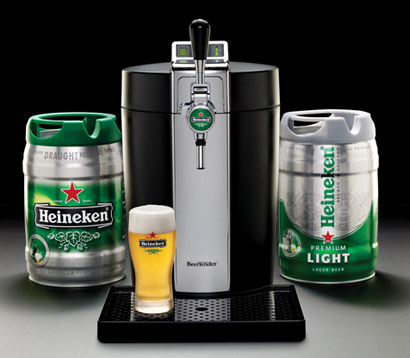
Heineken USA launched of BeerTender for the U.S. market. The devide is designed exclusively for the Heineken and Heineken Premium Light DraughtKegs. The countertop cooler uses a patented carbonator pressure technology to “deliver a perfect pour every time.”
Engineered by Krups, the BeerTender works this way: Insert a Heineken or Heineken Premium Light DraughtKeg into BeerTender, connect the included disposable draft tube, close the lid, and serve.
“BeerTender is an innovation in draft technology and a must-have for any beer aficionado who values a premium-quality draft beer experience and stylish product design,” Ken Kunze, senior vice president, chief marketing officer Heineken USA, said for a press release.
Not surprisingly, he is referring to drinking Heineken products.
Selected models allow the consumer to adjust temperatures to 36°F, 39°F or 42°F to accommodate a personal drinking preferences. And there is a 30-day freshness count-down indicator available on some models.
The BeerTender, designed to sell for between $279 and $299 depending upon the model, is already available in the Netherlands, France, Austria and Switzerland. More information is available at www.BeerTender.com.
